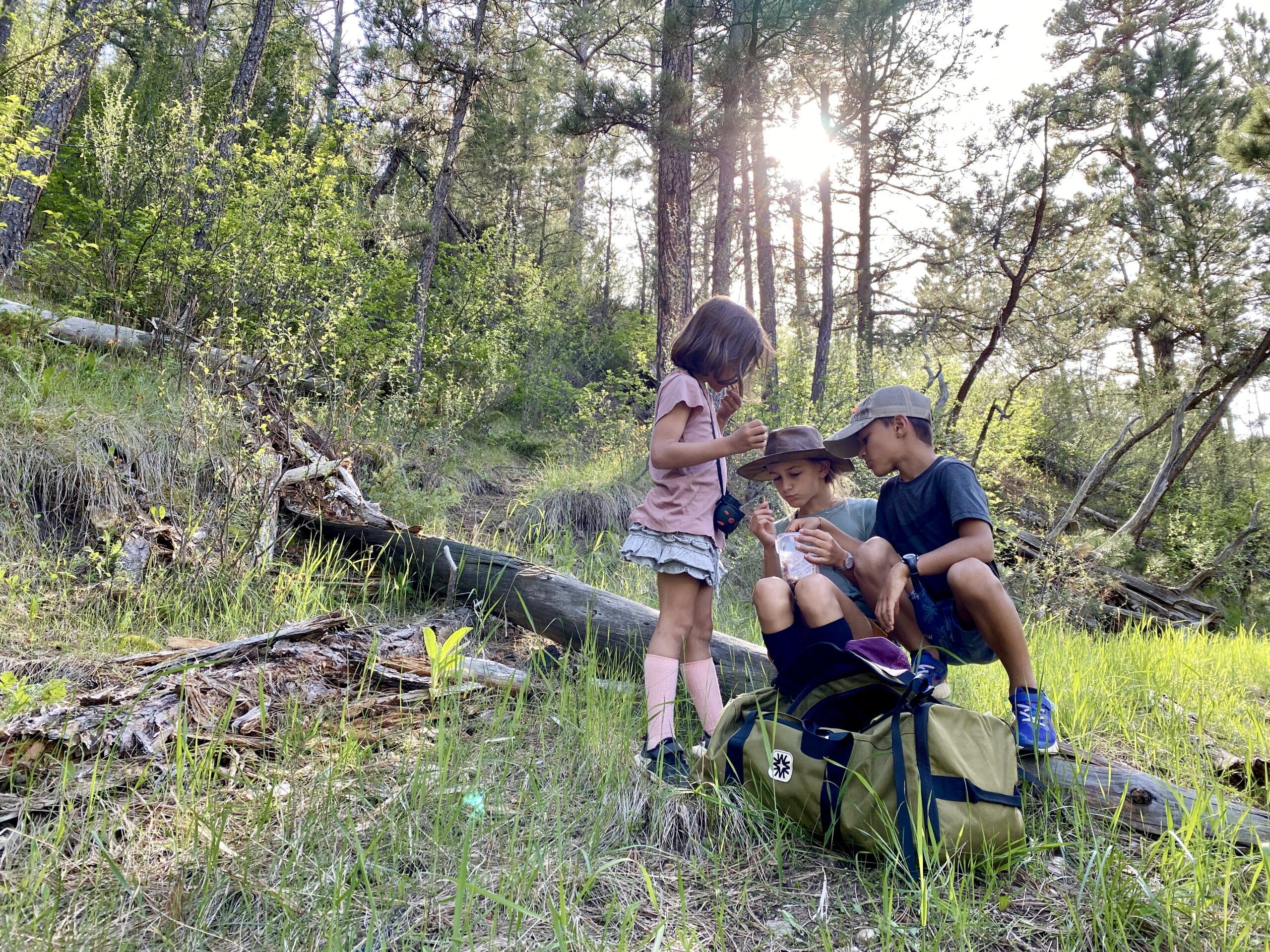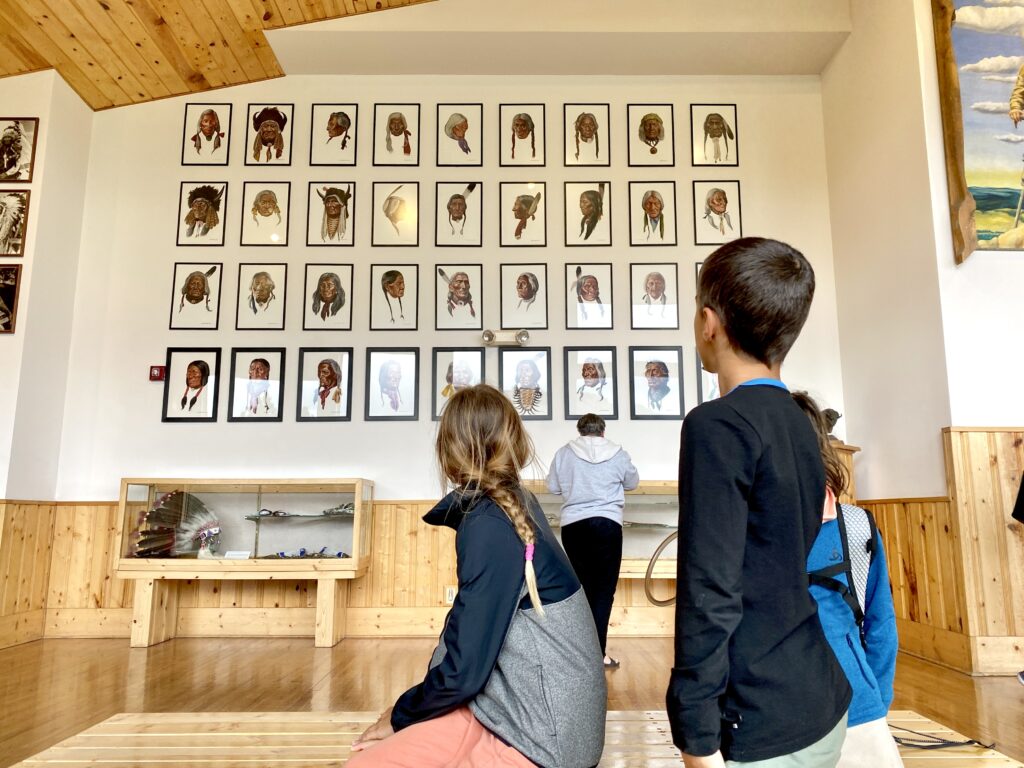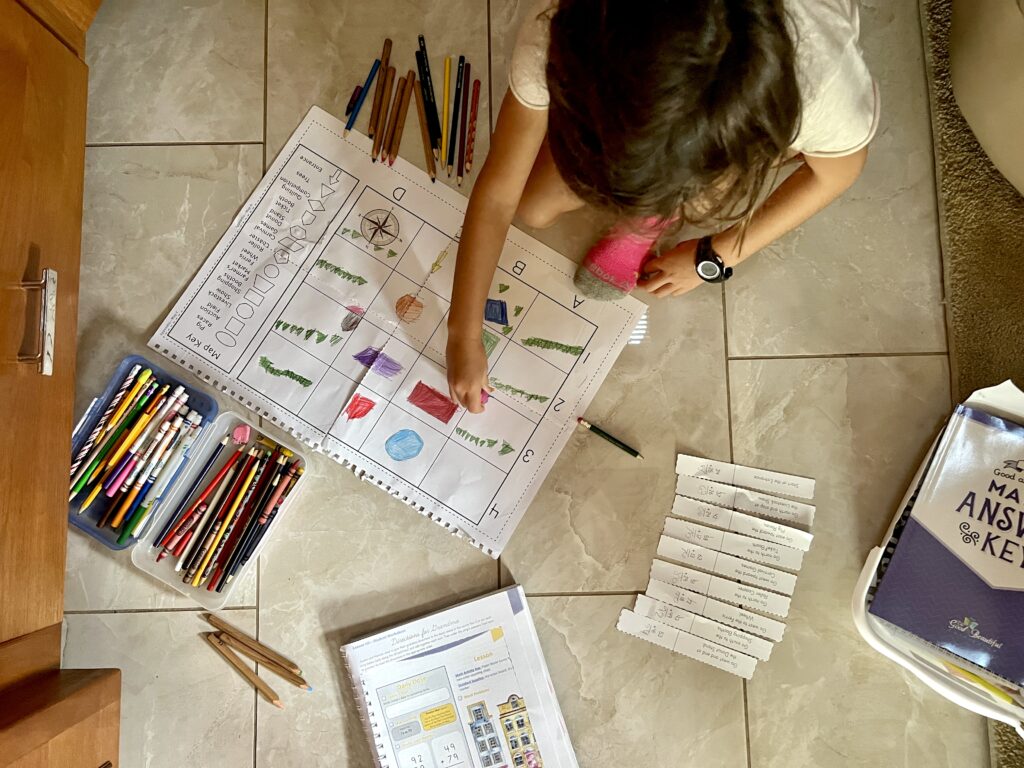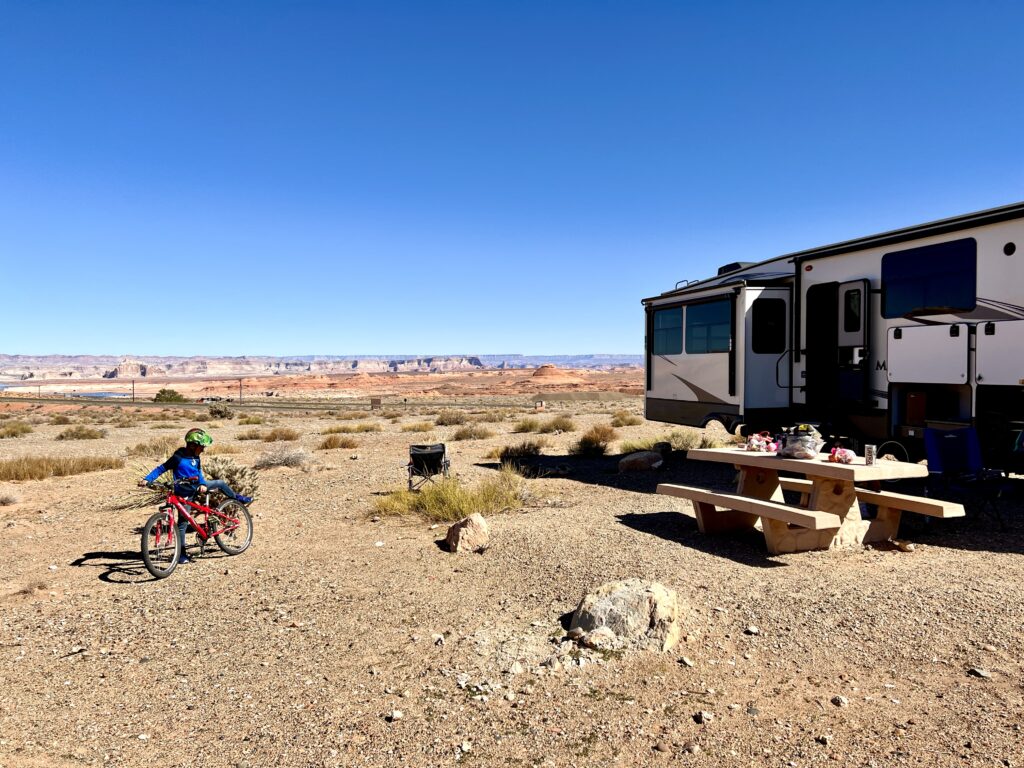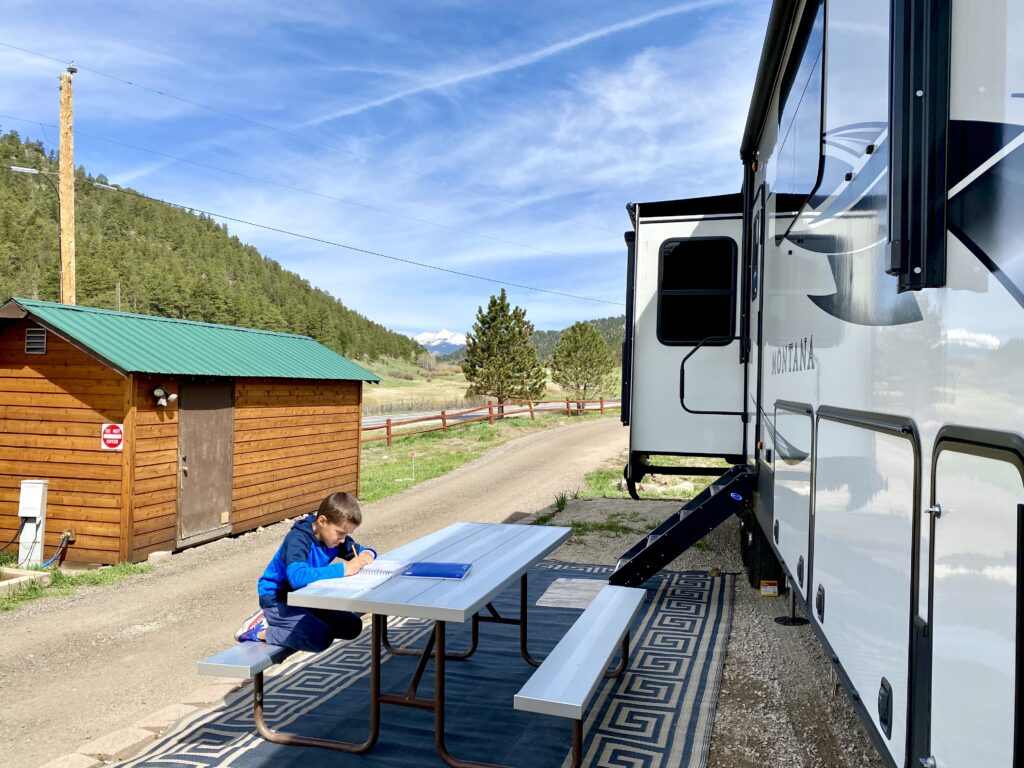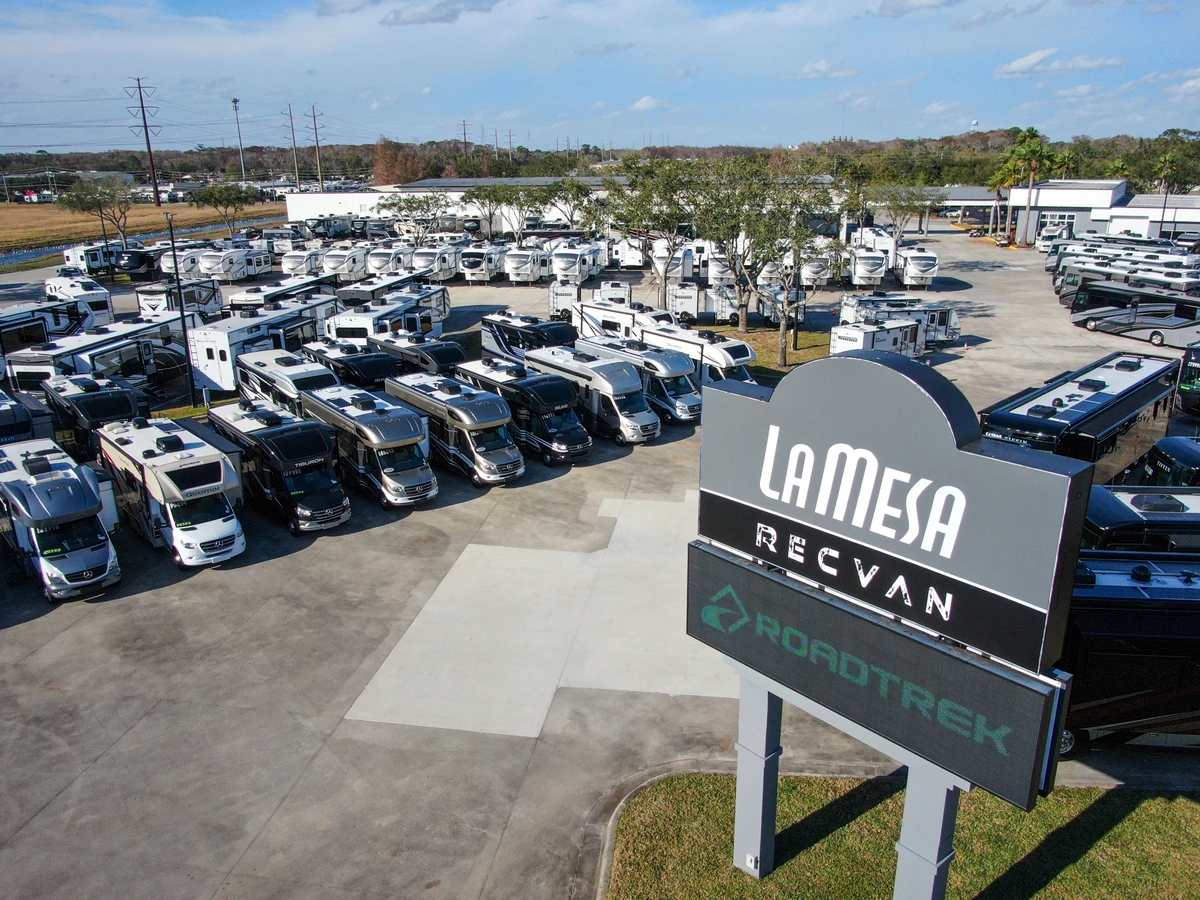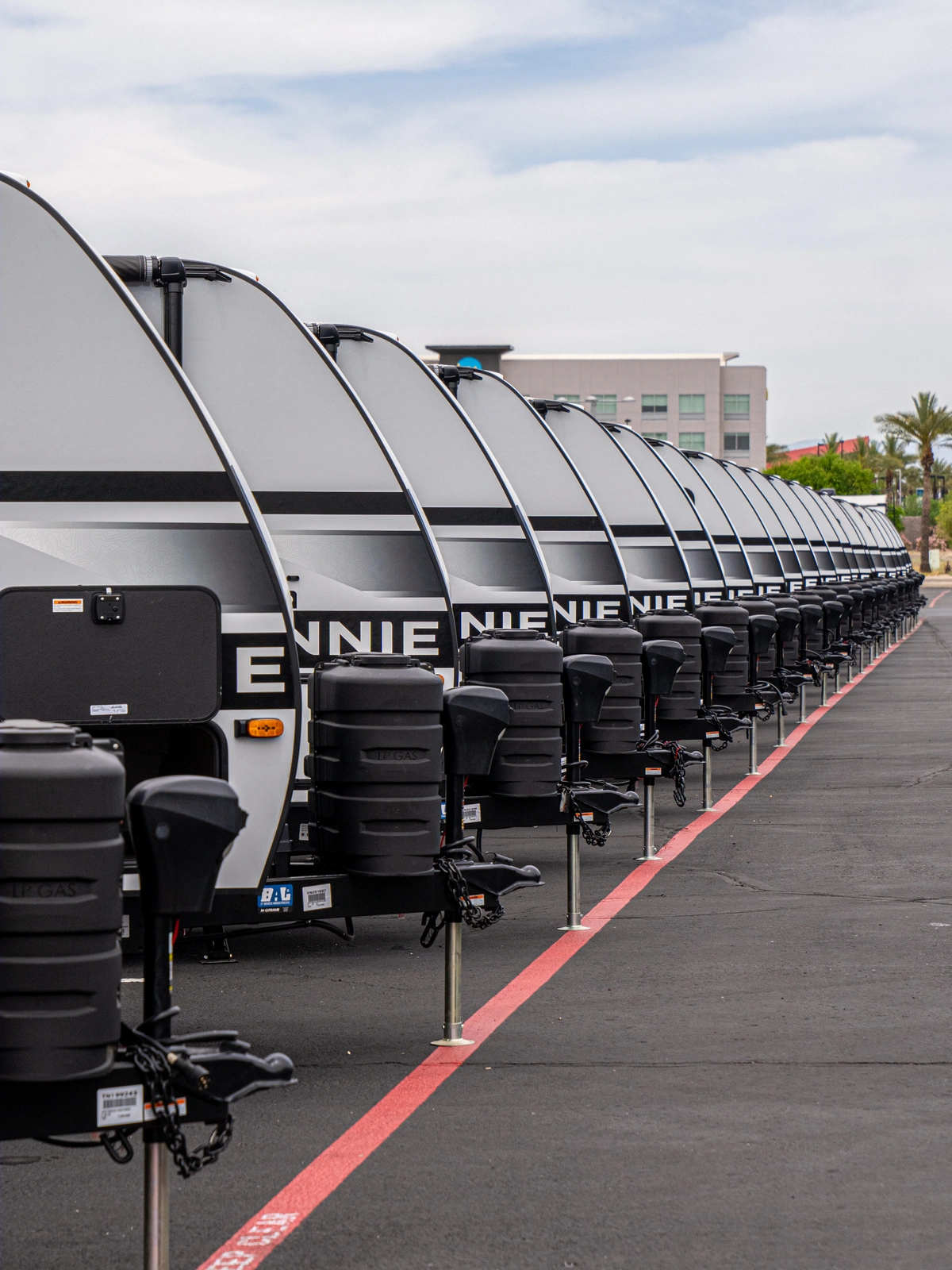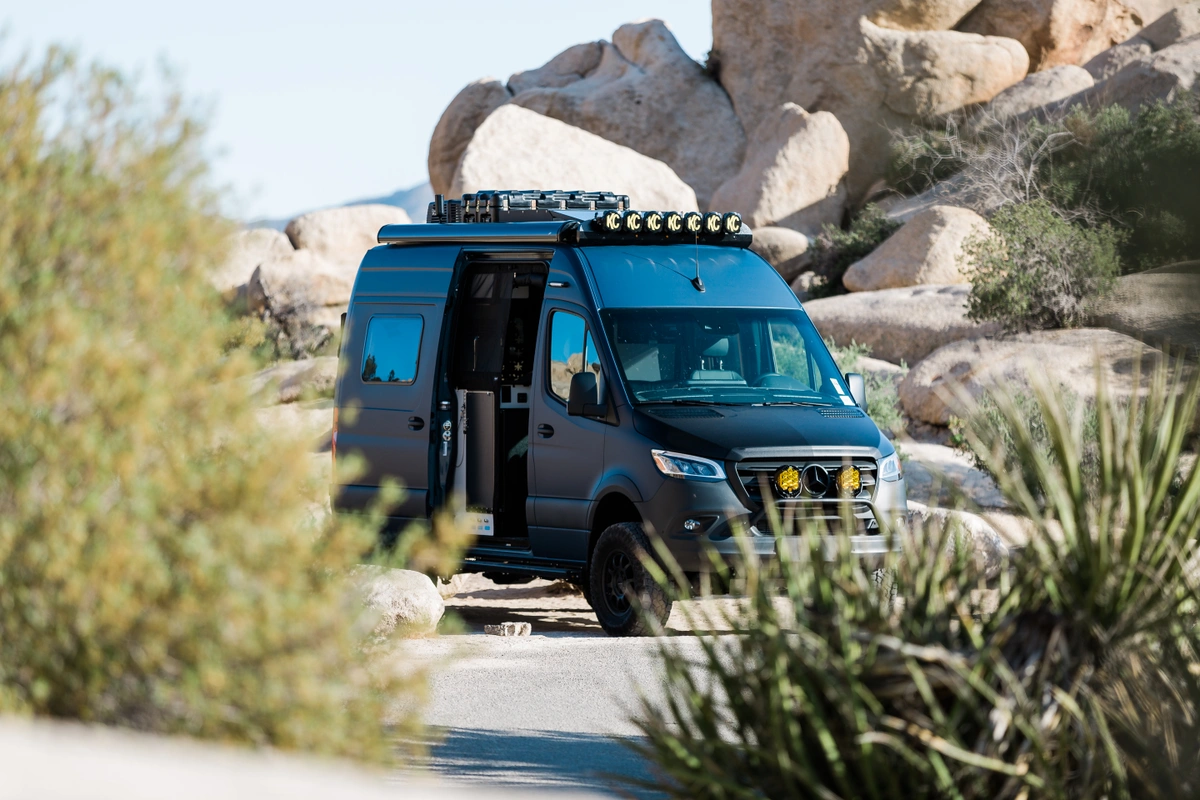Are you ready to embark on an RV adventure of a lifetime but homeschooling is holding you back? If so, we are debunking schooling on the road in today's installment of RVing With Kids.
We have been road schooling our three kids for the last 2.5 years and homeschooling was my largest fear when we were planning our world tour. I spoke with homeschooling friends, read up on my state's requirements, and took the plunge. It has been the most rewarding experience so far, and I am not sure we're going back to school when we settle back down. Read through our tips and you should feel much better about that big step on your way to full-time RVing!
Guest Post and photos by Laura Georgieff
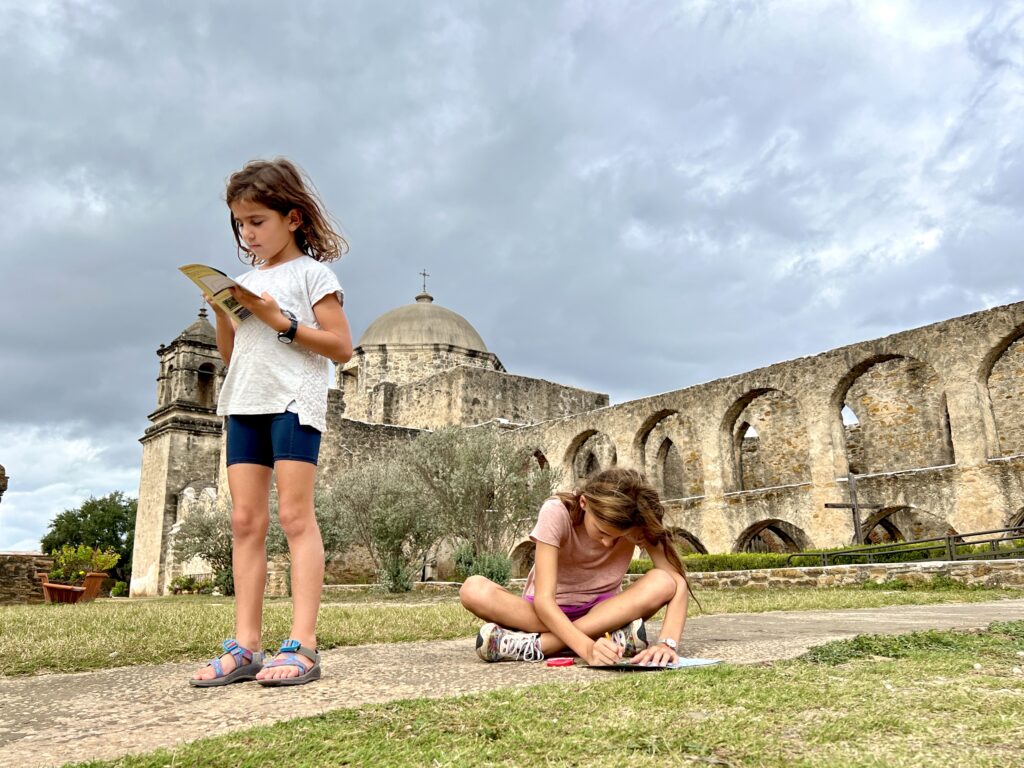
Different Schooling Methods
If you recently started researching homeschooling methods, your head is probably spinning. Between online schooling, homeschooling, unschooling, and road schooling, what should you choose? Let's look at each schooling method separately:
Online Schooling
Online schooling is the closest thing to sending the kids to school, and requires less parental involvement than other methods. You will usually sign up through your school county and the kids will get enrolled in the classes of your choice. Depending on your state and county, you can decide to enroll in select subjects, or all subjects. Children will log on in the morning, follow online classes led by a teacher, with whom you will check in regularly. They will follow a traditional schooling schedule, with lessons and homework, projects, etc.
From a parental standpoint, you won't have to do any lesson planning and can get your own work done while your child learns online.
The drawbacks: you will need to assist with homework, technology, and if you have children who are too distracted for screen learning, this option can be a bit of a struggle. Additionally, you need to have a good internet connection every day and able to dedicate several hours of work on a daily schedule, giving you less flexibility when it comes to adventuring.
Some counties offer a Flex version of their online schooling, where you are not bound to a schedule and lessons are available 24/7 for the child to complete within the week and turn in their work at the end of the week.
Homeschooling
Homeschooling gives you flexibility but requires high parental involvement. When homeschooling, you are solely responsible for your children's education. You choose the curriculum, and in most school districts you are not bound to any schedule, teaching hours, etc. The biggest challenge is finding the right curriculum. There are so many out there - faith-based, non-faith based, children-led, parent-led, open-and-go, computer-based, family-learning, etc. - you need to find something you feel great about. If you do find a curriculum you love however, homeschooling is pretty fantastic. It gives you flexibility to work when is convenient and explore at the best times. If you know that February will be spent visiting friends and family, or heavily skiing, you are welcome to start your school year a month early to make it work.
Additionally, many curriculums are designed on a 4-day week, and you will find that schooling is done pretty quickly when you are able to sit down 1-on-1 with your children. At the end of the school year, you will need to find an accredited teacher in your state to evaluate the work you did that year.
Unschooling
Unschooling is a very different concept, we have not experimented with. In unschooling, you let the children's interests lead their learning path. Learning is supposed to happen organically and traveling would be a great way to let the children explore, discover, and learn. Unschooling offers the most flexibility, but if your child (or you) need structure to thrive, you might find it challenging. There is usually no curriculum used in unschooling education, and the children learn by experimenting. As you travel, you might find that visiting historical parks, learning in museums, and reading help you child understand by experiencing, rather than sitting and being told. The children lead their own learning, instead of an adult delivering it. While this method is not for everyone, many swear by it and believe that their children are happier, and their family more harmonious, thanks to unschooling.
Road Schooling
Road schooling is a hybrid between homeschooling and unschooling, and our preferred schooling option on the road. When road schooling, you homeschool your children for certain subjects, following your homeschooling method of choice, and lead all other learnings through experiences.
Traveling full-time is the perfect time to road school. Most families use homeschooling curriculum to work through Math and Language Arts, which helps parents keep track of requirements and provide evaluators with the material needed to pass the children onto the next grade. Everything else - science, history, geography, social studies, etc - comes from experiences.
When RVing in the U.S., make sure to get an America the Beautiful (annual pass to all parks of the National Park Service system). You will not only gain access to the U.S. National Parks, but to over 400 parks, including the amazing National Historical Parks. If you choose to road school, I recommend visiting as many of those historical parks as possible, and you will find that you cover much more than regular grade-level history lessons. Make sure to have the kids complete the Junior Ranger Program in each national park site you visit, or attend ranger-led lectures.
Science museums become your science lessons. Make sure to take an annual membership at your local ASTC museum to benefit from free entry in science museums across the United States. Geography comes naturally as you travel and you could have the kids hold a travel journal or a map of their travel. Geology will become automatic learnings as you hike through the various national parks. Learnings are all around you and traveling is the best school there is. If you can cover your basis and homeschool Math and Language Arts, I promise you everything else will come naturally thanks to your travels!
Homeschooling Requirements
Before you leave home, do your homework and understand the specific requirements of your school district when it comes to home education. Each state has its own requirements and you need to make sure you follow all steps and requirements to allow your children to move on to the next grade at the end of the school year. This is especially important if you plan on moving the kids back to regular schools at the end of your trip. While some states will only require to see progress in a child's academic abilities, others might require proof of hours, daily curriculum, book lists, and more. Leave with a plan for the end of the year - know the requirements and secure an evaluator ahead of time.
Ensuring Your Kids Stay Focused While Schooling On The Road
You might be worried about your kids' social life on the road. Fear not... their social lives will be different than they are at home, but so rich and diverse. With each campground comes one, two, three, or a whole army of kids, becoming immediate best friends with yours and you will have a hard time asking your kiddos to focus on homework when they'd rather be cycling with their friends around the campgrounds.
Make sure to set a routine and expectations. You know your kids best but setting a routine usually helps the kids understand what is expected of them. Our family finds that sitting down and doing homework first thing in the morning works best. The children have an incentive to get done to go outside and play. It also allows for afternoon activities and hikes.
Flexibility
Flexibility can be hard for some, but it is paramount to having a positive schooling experience on the road. Remember that traveling is hard and exhausting - not just for the parents, but for the kids too. They are rarely asked if this is something they want to do, and they will have moments when they wish life was easy. Some days will be more difficult than others and you might want to take your classroom outdoors for a while. You might even need a break and decide to visit a museum instead of struggling at home. Other days will call for different schedules. If you are near a national park calling for a sunrise hike, homework will need to wait until the afternoon. Some days will require an entire day of driving.... You might need to skip school altogether. Situations arise on the road and you need to feel comfortable with giving in to control. This is where I struggle most, and on days that I try to push things, we typically end up with unnecessary drama.
Believe me, your kids are ahead. They are getting 1-on-1 attention, private lessons, and learning from experiences. They are a mile ahead of their little friends in school and you shall not worry about missing a day of school. Here's a tip - start schooling 2 or 3 weeks early in August. That will give you plenty of make-up days for times when things get a little harder, or for when a sunrise calls!
Space / Connection In Your RV
If you are embarking on full-time RV travels with kids, make sure to keep your RV space in mind when choosing your homeschooling curriculum of choice. Space is the first area of concern. Depending on the number of kids and number of subjects you will be teaching, books can be quite voluminous and heavy. Figure out the amount of space you have before purchasing the books. We love our math curriculum, but had to leave some of the manipulative behind as they were too bulky to store.
In some cases, online curriculums can work well, depending on the age and preferences of your children. We like our online typing classes for example, but prefer learning math and language arts on paper. If you do choose online learning for a portion, or all of your homeschooling, make sure that you have a reliable internet connection in your RV. I recommend leaving with at least two hot spots from two different carriers, as well as a large teethering plan on your cell phone contract.
Everything You Need To Know About Schooling On The Road
I hope that this guide has helped you gain clarity and confidence in schooling your children on the road.
It does not have to be hard. Your first step is understanding the requirements of your state, then find a curriculum you will enjoy teaching, and finally have some fun with it.
Learning on the road is so fun and so much more enriching than learning behind a desk at school. Once you find the right set up for your family, the routine will ensue and you won't be looking back.
